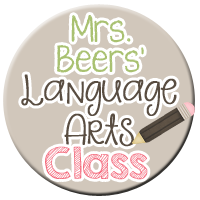This week's summer linky topic is "Fun with Phonemic Awareness and Phonics". Since I've found there is a lot of confusion about what phonemic awareness is, I thought I'd write about that.
So, what is phonemic awareness (PA) ?
Phonemic awareness is the umbrella term used to describe the ability to think about, identify and manipulate parts of words (phonemes, syllables, onsets/rimes). Also included is the ability to recognize and produce words that rhyme.
Phoneme and phonemic awareness are interchangeable terms.
Why build children's PA skills?
PA predicts later outcomes in reading and spelling.
The majority of poor readers have some difficulty with PA and other phonological skills.
Instruction in PA is beneficial for beginning readers and spellers.
PA lays the foundation to oral language and vocabulary development.
Is There a Sequence of PA Skills?
Here is a basic progression phonological skills in order from the most basic to the most advanced:
*Word awareness-tracking words in sentences, repeating a sentence, counting/clapping words in a a sentence, knowing first/last word
*Syllable awareness-counting, tapping, blending or segmenting a word into syllables
*Onset and rime manipulation-ability to produce a rhyming word depends on understanding that rhyming words often have the same rime (word part). An example of this is "bat" and "cat" both end with "-at" (that's the rime). Recognizing this is MUCH easier than producing a rhyme.
*Identify and match the initial sounds in words, then the final and medial sounds.
*Segment and produce the initial sound, then the final and medial sounds.
*Blend sounds into words.
*Segment the phonemes in two-or-three-sound words, moving to four-and five-sound words.
*Manipulate phonemes by deleting, adding or substituting sounds.
What do all these have in common? Children are HEARING sounds/changes. They are not required to write words or see words in print. Once a letter is attached to a sound, it becomes PHONICS instruction.
Too many times (in my early years of teaching, I was guilty as well), teachers skip over phonemic awareness skill building activities, thinking their students already know them. I can tell you, from lots of experience (and data collected from testing), phonemic awareness is an area of weakness for ALL of my Title I students (as well as among "average" students).
Check out this site:
It has SO much great information about young readers. The image above is directly linked to one of many informational articles on PA.
Below, you can find FREE fun, super simple and effective ideas to try in your classroom to help build your students' phonemic awareness. Other than printing a copy for yourself, no other major prep work is needed.
Click here for FREE PA task cards:
Just print and use these cards to help you with on-the-spot PA activities to use with your students. They can be used anytime/anywhere (waiting in line, during morning meeting, etc.). Print on card stock and keep on a ring.
On each card, you will see the average age when students should acquire each skill. These are not hard and fast ages, only approximations. Students who are more advanced can definitely benefit from practice with easier PA skills, but a harder skill WILL frustrate a child who has weak PA skills. Choose carefully. Hope you enjoy!
Join the linky party below.











